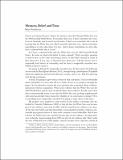Files in this item
Memory, belief and time
Item metadata
| dc.contributor.author | Weatherson, Brian James | |
| dc.date.accessioned | 2017-07-08T23:33:20Z | |
| dc.date.available | 2017-07-08T23:33:20Z | |
| dc.date.issued | 2016-01-08 | |
| dc.identifier | 230788799 | |
| dc.identifier | 3626b403-d855-4c15-91a2-3ebb31b5eb76 | |
| dc.identifier | 84954114294 | |
| dc.identifier.citation | Weatherson , B J 2016 , ' Memory, belief and time ' , Canadian Journal of Philosophy , vol. 45 , no. 5-6 . https://doi.org/10.1080/00455091.2015.1125250 | en |
| dc.identifier.issn | 0045-5091 | |
| dc.identifier.uri | https://hdl.handle.net/10023/11169 | |
| dc.description.abstract | I argue that what evidence an agent has does not supervene on how she currently is. Agents do not always have to infer what the past was like from how things currently seem; sometimes the facts about the past are retained pieces of evidence that can be the start of reasoning. The main argument is a variant on Frank Arntzenius’s Shangri La example, an example that is often used to motivate the thought that evidence does supervene on current features. | |
| dc.format.extent | 134211 | |
| dc.language.iso | eng | |
| dc.relation.ispartof | Canadian Journal of Philosophy | en |
| dc.subject | Memory | en |
| dc.subject | Knowledge | en |
| dc.subject | Belief | en |
| dc.subject | Rationality | en |
| dc.subject | Time | en |
| dc.subject | B Philosophy (General) | en |
| dc.subject.lcc | B1 | en |
| dc.title | Memory, belief and time | en |
| dc.type | Journal article | en |
| dc.contributor.institution | University of St Andrews. School of Philosophical, Anthropological and Film Studies | en |
| dc.contributor.institution | University of St Andrews. Philosophy | en |
| dc.identifier.doi | 10.1080/00455091.2015.1125250 | |
| dc.description.status | Peer reviewed | en |
| dc.date.embargoedUntil | 2017-07-08 |
This item appears in the following Collection(s)
Items in the St Andrews Research Repository are protected by copyright, with all rights reserved, unless otherwise indicated.

